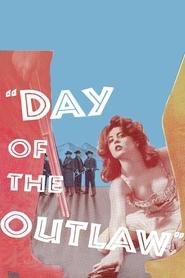Bitters, Wyoming, indeed. It's remarkable how much Alexander Courage's musical score really marks this as a late-1950s studio picture. Also, as a snow-bound Western that has a morality somewhere between the Western and the revisionist Western, you've got to ask whether Robert Altman managed to catch this.
The group is led by Jack Bruhn (Burl Ives), an AWOL Army captain who fancies himself a noble criminal. But in a film that’s already established its protagonist as a raging, loathsome man, there’s no room here for romantic notions of crime. [In] most westerns, towns suggest small oases of civilization and habitability away from the inhospitable deserts outside their borders, but in Day of the Outlaw, the opposite is true. Here, lush groves of trees surround the town, but the city itself is a trammeled and filthy place of muddy, slushy roads. Interiors are sparsely decorated, leaving little to distract the invaders from their rapacious thoughts.
— Jake Cole (Slant Magazine)
Building interiors are largely barren, with tables and stairs bisecting the frame and mirrors unbalancing the image. Reflections and doublings are important motifs, as these mirrors allow De Toth to shoot Blaise or Bruhn in isolation while the faces of the people they address are visible in the reflective surfaces. De Toth also has Blaise and Bruhn each deliver monologues in separate scenes from atop stair cases, looking down on the spectators below. This links the men visually while suggesting that each fancies themselves a kind of king. Of course, once Blaise leads the bandits into the snowy wasteland, the landscape renders all the men equally anonymous; nature has all real power here, and it is unforgiving.[…]
That Blaise survives the dangerous trek and returns to town victorious could be read as a happy ending, but De Toth undercuts even this brief moment of optimism. Blaise enters a building without noticing any of the people he’s managed to save, shutting the door behind him. Reflected in the window are the ominous mountains, now home to a litany of fresh corpses. Much like Ethan Edwards leaving the homestead at the end of Ford’s The Searchers, Ryan’s brutal cattleman can no longer be a part of the society he has helped build. Blaise has become the “anonymous actor” in this drama, his part played out, his usefulness over. Perhaps he died in the mountains after all.
— Daniel Gorman (In Revew Online)

